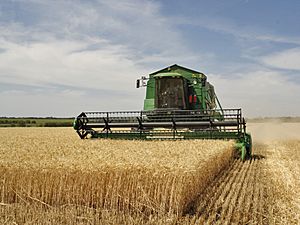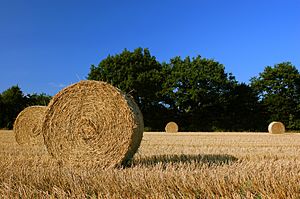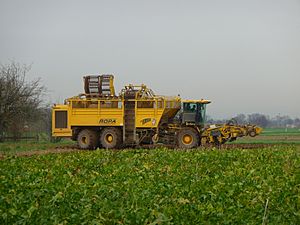Harvest facts for kids
Harvesting is when farmers collect ripe crops from their fields. Think of it as picking fruits, vegetables, or grains when they are ready to eat or use.
When people talk about reaping, they usually mean cutting down grains like wheat or corn, or beans and peas. This was often done by hand using tools like a scythe or a sickle.
On smaller farms, harvesting can be a lot of hard work done by hand. But on big farms, special machines called combine harvesters do most of the work. These machines are very expensive and complex. Modern machines use conveyor belts to gently pick and move crops, making the job much faster and easier than doing it by hand.
The word "harvesting" can also include what happens right after the crops are picked. This includes cleaning them, sorting them, packing them up, and keeping them cool.
When the harvest is finished, it means the growing season for that crop is over. This is a big deal in many cultures, and people often celebrate with special harvest festivals.
Contents
What Does "Harvest" Mean?
The word "harvest" comes from an old English word, hærfest. This word used to mean "autumn" (the season) or "August." In some parts of Britain, it still means autumn.
Over time, "the harvest" started to mean the actual work of collecting and storing crops in the autumn. It also came to mean the crops themselves. So, when we say "to harvest," it means to gather and store the crops. People who do this work are called harvesters, and the act of doing it is called harvesting.
When Crops Don't Grow Well
Sometimes, crops don't grow as expected. This is called a crop failure or harvest failure. It means there are far fewer crops than farmers hoped for. This can happen if plants get damaged, die, or don't produce enough fruit, seeds, or leaves.
Many things can cause crop failures:
- Plant diseases: Like the Great Famine in Ireland, which was caused by a potato disease.
- Bad weather: Heavy rain, volcanic eruptions, big storms, floods, or long periods without rain (called drought) can all harm crops.
- Soil problems: Over time, soil can become less fertile, too salty, or wear away (called erosion). This can happen from too much farming, not enough water, or using too many fertilizers.
In the past, crop failures often led to famines, where people didn't have enough food. This sometimes made people move away from their homes to find food.
Today, many farms grow just one type of crop in huge fields. This is called monoculture. While it can be efficient, it can also make the soil less healthy over time. Luckily, modern international trade helps prevent local crop failures from turning into widespread famines, as food can be brought in from other places.
Other Ways We Use "Harvesting"
The word "harvesting" isn't just for farm crops. It's used in other ways too:
- Fishing: When people catch fish, it's sometimes called harvesting fish.
- Logging: Cutting down trees for wood is also called harvesting timber.
- Wine: Collecting grapes to make wine is called harvesting grapes.
- Water: Water harvesting means collecting rainwater, often for farming or for people to use in their homes.
- Energy: Energy harvesting is about capturing and storing energy that would otherwise be wasted. This can include solar power from the sun, wind energy, or even the energy from movement (kinetic energy).
Images for kids
See also
 In Spanish: Cosecha para niños
In Spanish: Cosecha para niños
 | Dorothy Vaughan |
 | Charles Henry Turner |
 | Hildrus Poindexter |
 | Henry Cecil McBay |







